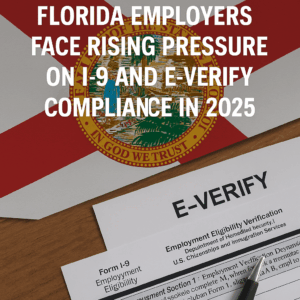May 05, 2025 | Posted By: Emma Doull
 As immigration policy continues to generate national debate, Florida has taken one of the most aggressive stances in the country regarding employment verification. Since July 1, 2023, the state’s mandatory E-Verify law has imposed strict documentation requirements on private employers, backed by steep penalties for noncompliance. Now, in 2025, new legislation proposes to expand those requirements even further, potentially impacting small businesses and sole proprietors across the state.
As immigration policy continues to generate national debate, Florida has taken one of the most aggressive stances in the country regarding employment verification. Since July 1, 2023, the state’s mandatory E-Verify law has imposed strict documentation requirements on private employers, backed by steep penalties for noncompliance. Now, in 2025, new legislation proposes to expand those requirements even further, potentially impacting small businesses and sole proprietors across the state.
Whether you operate a large company with federal contracts or run a small business that hires local workers, understanding your responsibilities under Form I-9 and E-Verify is essential. Employers who fail to comply face serious risks, including audits, daily fines, and the suspension or loss of their business licenses. In this post, we’ll break down the current state of the law, the proposed changes, and the steps your organization should take to stay ahead of enforcement.
What Are Form I-9 and E-Verify?
Form I-9 is a federal document required for all U.S. employers to complete when hiring a new employee. Its purpose is to verify the identity and work authorization of the individual. Employees must complete Section 1 of the I-9 on or before their first day of employment, and employers are required to examine acceptable documents and complete Section 2 within three business days. Employers must then retain these forms for either three years after the hire date or one year after the employee leaves, whichever is later.
E-Verify, by contrast, is an online system operated by the U.S. Department of Homeland Security. It cross-references information from the I-9 form with government databases, including the Social Security Administration and DHS. While E-Verify is voluntary at the federal level for most private employers, Florida law mandates its use in certain circumstances, and that mandate may soon become universal.
Under Section 448.095 of Florida’s Statutes, private employers with 25 or more employees must use E-Verify to confirm the work eligibility of all new hires. They must also retain supporting documentation, including I-9 forms and E-Verify confirmations, for a minimum of three years. Public employers and state agencies are also required to use E-Verify and must ensure their contractors and subcontractors comply.
Employers who fail to use E-Verify can be subject to serious consequences. The Florida Department of Law Enforcement (“FDLE”) is authorized to conduct random audits, and businesses found in violation may face civil penalties, including fines of $1,000 per day for third-time offenses. Repeated or egregious violations can result in one-year probation or revocation of the business license altogether.
On March 4, 2025, Florida lawmakers introduced Senate Bill 782 (“SB 782”), which sought to expand the state’s existing E-Verify requirements to cover all private employers, regardless of size. If enacted, the bill would have eliminated the 25-employee threshold and introduced harsher penalties, including possible license suspension after a single violation. Although this legislation ultimately died in committee and was withdrawn from consideration during the 2025 session, it still offers a revealing glimpse into the direction state policymakers are heading.
SB 782 may be off the table for now, but it reflects a clear trend: Florida continues to prioritize the aggressive enforcement of employment verification laws, even beyond what federal law requires. The legislative intent behind the bill—greater accountability, fewer exemptions, and harsher consequences—is likely to reemerge in future proposals, signaling to employers that scrutiny of hiring practices will intensify.
That’s why private employers should not take the death of SB 782 as a sign to stand down. With state agencies already authorized to conduct audits and issue fines under current law, now is the time to strengthen compliance, especially for small businesses that may have previously gone undetected.
Even employers acting in good faith can find themselves out of compliance due to simple errors. Some of the most common pitfalls include failing to complete I-9s on time, accepting expired or incorrect documents, or improperly using the E-Verify system, such as verifying an employee before a formal job offer is made. Employers also frequently forget to retain E-Verify confirmation numbers or fail to maintain records for the required time period.
It’s important to remember that using I-9 or E-Verify does not automatically shield an employer from liability. These are verification tools, not legal defenses, and improper use, or non-use, can still lead to enforcement action.
Florida law does offer some limited defenses to employers under investigation. First, if an employer uses E-Verify properly and receives a confirmation of employment eligibility, the law presumes that the employer did not knowingly hire an unauthorized worker. Second, if an employer correctly follows I-9 procedures, including reviewing and retaining the proper documents, they may be protected from penalties, though this is a riskier strategy for employers currently subject to E-Verify requirements.
Still, for employers covered under current law and those who might be impacted by future legislation, relying solely on I-9 documentation is no longer a sufficient defense. Forward-thinking businesses should take steps to prepare now, even if not currently mandated to use E-Verify.
Steps Employers Should Take Now
To stay compliant and minimize risk, Florida employers should take the following actions:
- Determine Whether the Law Currently Applies to You
If you have 25 or more employees, you are already required to use E-Verify. However, the state’s recent legislative efforts suggest that broader coverage may be proposed again soon. - Enroll in E-Verify
Registration is free at e-verify.gov. Once enrolled, update your hiring procedures and ensure HR staff are trained in proper use. - Audit Your I-9 Records
Review current I-9 files to ensure timely completion, valid documentation, and proper retention practices in accordance with federal and state rules. - Stay Informed on Future Legislative Developments
Although SB 782 did not pass, similar proposals are likely to surface in the next session. Being proactive now helps you avoid last-minute compliance headaches later. - Educate Your Team
Ensure hiring managers understand the legal requirements, avoid discriminatory practices, and accurately document verification steps.
Florida’s continued push toward more universal E-Verify enforcement is more than just a policy trend; it’s part of a broader shift in the state’s approach to immigration and employment law. Ignoring or postponing compliance measures can expose your business to fines, audits, reputational harm, and potentially the loss of your license.
At Hoyer Law Group, we help Florida employers navigate this complex and evolving regulatory environment. Whether you’re a small business preparing for likely future changes or a larger company undergoing an audit, our attorneys can assist with I-9 best practices, E-Verify enrollment, compliance audits, and policy development designed to reduce your legal exposure. Contact us for a confidential business evaluation.

